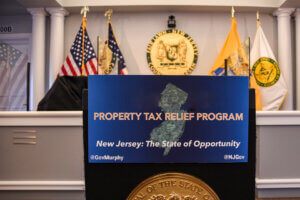Authors:
Patrick Murray:732-263-5858
Helene Schlegel: 732-614-7013
Thomas Lamatsch: 732-263-5672
INTRODUCTION
Transparency in government has become an important issue across the nation. New Jersey adopted the Open Public Records Act (“OPRA”) in 2002 to make government records “readily accessible for inspection, copying, or examination by citizens of this State.” The law applies not only to state agencies, but nearly every public entity in the state, including all 566 municipal governments.
How successful has the OPRA law been? Public reports have been largely negative, focusing on allegations of denied access, lengthy waiting periods, and excessive fees. It’s important to note that most of these reports are based on single experiences or anecdotal evidence. Moreover, they focus on outcomes. While these reports provide valuable information about how the law is working, they tell us little about how the process contributes to those outcomes. Considering the large number of government entities responsible for fulfilling OPRA requests, it is not surprising that implementation of the law varies widely across the state.
This study focuses on one specific class of public entities covered by the OPRA regulations: municipal governments. For purposes of this study Registered Municipal Clerks were identified as the person most responsible for OPRA compliance. Clerks by definition are the “custodian of records” for local governments. Email invitations were sent to municipal clerks to participate in a confidential online survey between December 2009 and February 2010. Clerks, or their designees, from 260 municipalities completed the survey, for a 46% response rate. The sample proportionally represents the distribution of towns throughout the state by population size, degree of urbanization, and location.
The survey was designed to assess the implementation success of OPRA from the municipal government perspective, as well as the impact of OPRA on workload, finances, training needs, and attitudes.
THE OPRA WORKLOAD
The typical New Jersey municipality receives 50 OPRA requests per year. However, the number of requests varies widely town-by-town. For example, 34% of municipal clerks report that their offices receive at least 100 requests per year, while 35% say that they get no more than 25 requests.
Larger towns are more likely to receive a large number of requests. Clerks in municipalities with more than 25,000 residents report that a median of 250 OPRA requests were received in 2009. This number drops dramatically to a median of 72 requests for towns with 7,500 to 25,000 residents; 30 requests for towns of 2,500 to 7,500 people; and 13 requests per year for smaller towns.
While OPRA requests are submitted throughout the year, they tend to spike in the fall and trail off during the winter months. More than half (56%) of all clerks report that September and October are among the busiest months for receiving OPRA requests. This is true regardless of whether the town has non-partisan spring elections or partisan fall elections. It also holds true for municipalities larger than 2,500 residents, regardless of their relative size. Towns smaller than 2,500 people, though, are less likely to see an autumnal spike in OPRA requests.
The most frequently requested documents via the OPRA process include permits (24%) and other construction or building information (19%), council minutes or agendas (23%), and local ordinances (17%). Other information that is frequently requested using the OPRA process are tax records (15%), planning and zoning information (14%), police records (12%), environmental information (10%), and public contracts (10%).
Towns with more than 7,500 residents report that permits are among their most frequently requested items, while meeting minutes and agendas are the most frequently requested items in towns with 2,500 to 7,500 residents. The largest New Jersey towns are also the most likely to receive submissions for environmental information – one-fourth of clerks from towns with over 25,000 residents report that these items are the source of frequent OPRA requests.
Eight-in-ten municipal clerks report that their work load has increased over the past two years due to OPRA, including 31% who say their workload has increased a lot and 49% who say it has increased a little. Seven-in-ten (71%) say that the number of OPRA requests they receive significantly takes away from their ability to carry out other municipal responsibilities. On the other hand, 62% agree that they have adequate resources to handle their current OPRA load, but this drops to 43% among large municipalities with 25,000 or more residents.
Most clerks – 61% – report that their office spends no more than two hours per week dealing with OPRA requests. At the other end of the spectrum, 21% report that they spend more than five hours per week. These are most likely to be municipalities that field more than 100 OPRA requests per year (generally towns with 25,000 or more residents).
Towns that deal with many OPRA requests are unlikely to have significantly larger staffs to deal with this workload. Among towns that receive 25 or fewer OPRA requests per year, 14% have no full time staff, 37% have one staff member, 33% have two paid staff members, and 17% have more than two employees in the clerk’s office. Among towns that receive 26 to 100 OPRA requests, 32% have one staff member, 37% have two, 23% have three, and 7% have four. But among towns that field more than 100 OPRA requests annually, 43% have less than three full-time staff members, 30% have three, and just 27% have between four and seven full-time staff.
Among towns that have only one person in the clerk’s office, there is a very high correlation between the number of OPRA requests received and the amount of weekly staff time spent dealing with those requests. This correlation drops off among larger towns. In other words, the clerk’s offices in larger towns are spending less time per week on OPRA requests. It is not possible to determine causes of this discrepancy from the survey results. Some possibilities include: clerk’s offices in larger towns could be more likely to hand off OPRA requests to other departments for compliance, thus spending less time being handled by the clerk’s staff; larger towns are more efficient in handling OPRA requests; or conversely, that larger towns take more than a week to respond to OPRA requests because of their greater overall workload relative to mid-sized towns. Further research is needed to answer this question.
WHO FILES OPRA REQUESTS
While there have been anecdotal reports of gadflies tying up the system with serial OPRA requests, the survey indicates such incidents are not widespread. Clerks report that the vast majority of their OPRA requests come from unique requesters. Specifically, a typical town reports that 80% of its OPRA requests come from unique requesters, that is persons who submit no more than one request per year. However, towns that receive more OPRA requests end up dealing with more multiple submissions from the same requesters. For example, towns that typically receive 25 or fewer requests per year report that just 10% are from people who submit more than one request in a year. But among those who receive 26 to 100 requests, 25% are from multiple submitters, and for towns that receive more than 100 requests, 33% are from multiple submitters.
In any event, all towns report that the most frequent OPRA submitters are their own residents – 37% say that most requests in the past two years came from their residents and 40% say that some requests came from their own residents – for a total of 77%. The second most active group of OPRA requesters come from the legal profession – 47% of clerks report that at least some of their requests comes from attorneys. In fact, 62% of clerks report that more attorneys are now using OPRA rather than the standard judicial discovery process to obtain information for lawsuits or other legal actions.
The largest towns are the most likely to report that attorneys comprise a large part of the OPRA workload – 76% of municipalities with over 25,000 residents report that attorneys submitted a significant number of the OPRA requests they received in the past two years. This drops to half for towns of 7,500 to 25,000 residents and to 3-in-10 for towns smaller than 7,500 residents.
Other people who submit requests tend to do so less frequently than residents and attorneys. Overall, 27% of clerks report that at least some of their town’s OPRA submissions come from the media, 23% say the same for politicians or political organizations, 11% for union representatives, and 11% for other government employees.
About one-third of towns with a population of 7,500 or greater say that journalists submit a significant portion of their OPRA requests, compared to about 1-in-5 smaller towns who say the same. Just over 1-in-3 clerks (36%) specifically report that most of their OPRA requests come from people or groups who want the information for political purposes.
AWARENESS OF OPRA REQUIREMENTS
Municipal clerks are the first line of inquiry for handling OPRA requests. However, not all clerks feel they are completely familiar with every aspect of the regulations governing OPRA. Overall, 71% of clerks surveyed say they are fully familiar with the seven day time limit imposed by the law for responding to an OPRA request, but only 46% say they are fully aware of other legal obligations. Just about half say they are fully familiar with the penalties for not complying with OPRA (54%). Awareness of the law’s specific provisions tends to be lower among clerks in smaller towns and higher among those in larger towns.
According to the OPRA law, some types of information can be withheld in order to protect confidentiality. Just over 1-in-3 (36%) clerks report that they are fully familiar with which types of information can be kept confidential and which information needs to be released upon request. Furthermore, 40% of clerks feel that it is important for the municipality to find out what the information will be used for before responding to an OPRA request.
In many towns, OPRA requests are forwarded from the clerk’s office to the department that handles the particular type of information included in a specific request. Most clerks, though, are not confident that staff in other municipal departments are up to speed on the law. Only 17% report that staff in other municipal departments that handle OPRA requests are fully familiar with their municipality’s obligations under the law.
OPRA’s IMPACT
Do clerks think OPRA is successful? It depends on your definition. Most municipal clerks (63%) report that the OPRA law has increased government transparency. Still, just 44% of town clerks say that OPRA has really been successful in its overall goal to promote more government transparency, while 20% say it has been unsuccessful, and 37% say it has had no real impact either way.
One of the concerns from the local government perspective was that OPRA would be used primarily for political aims and serial requests that would “clog” the system. While that has certainly happened, it does not appear to be particularly widespread. Only about one-third report that OPRA is used largely to dig up information for political purposes and few say they are inundated with multiple requests from local gadflies.
Importantly there are clear disparities among the state’s 566 municipalities in awareness of the law and the availability of resources to fulfill OPRA requests. Larger municipalities receive more OPRA requests. However, they are less likely than smaller towns to have staff hours available to handle those requests. One of the sticking points for clerks across the state is the time period allotted to meet, or at least respond to, OPRA requests. One of the top suggestions given by clerks to improve their ability to implement the law is to increase the seven day time period for responding to a request.
Another key finding of the survey is that staff in smaller municipalities that receive fewer requests are less likely to be fully familiar with OPRA requirements. Furthermore, in larger towns, where OPRA requests may be delegated to different departments, it is likely that staff in those other departments are not as familiar with OPRA regulations as staff in the clerk’s office.
It’s also worth noting that a sizable number of clerks may feel it is appropriate to ask the purpose of the request, which is contrary to the provisions of OPRA. About 4-in-10 clerks agree that it is “important for the municipality to find out what the information will be used for before filling an OPRA request,” with the number being somewhat higher among small town staffs.
In the end, municipal clerks are among the first to suggest that local government personnel need more and better training to increase knowledge of what OPRA requires them to do. Overall, 65% of New Jersey clerks feel that their staff could use more training to better understand the state’s OPRA rules.
QUESTIONNAIRE: The Impact of OPRA from a Municipal Government Viewpoint
A survey of New Jersey Municipal Clerks (n=260)
The intent of New Jersey’s Open Public Records Act (OPRA), which was passed in 2002, is to provide citizen access to public documents. The purpose of this research is to evaluate the implementation of OPRA from the local government perspective. Please answer the following questions as they apply to your municipality. Thank you for assisting with this research.
OPRA Requests
[Please note: if you do not have exact numbers in your records, please provide your best estimate.]
1. How many OPRA requests did your municipality receive in the 2009 Fiscal Year (July 1, 2008 to June 30, 2009)?
2. Sometimes the same person may submit more than one OPRA request per year. Approximately how many different individuals or groups submitted FY2009 OPRA requests?
3. And how many OPRA requests did your municipality receive in the 2008 Fiscal Year (July 1, 2007 to June 30, 2008)?
4. Which month (or months) typically generated the most OPRA requests? [Check up to 3 boxes]
5. What type of document(s) are most frequently requested via OPRA? [Multiple responses accepted]
6. Of all the OPRA requests you received in the past two years, how many came from each of the following sources:
– Journalists, media
– Attorneys
– Union representatives
– Politicians, candidates, political parties, and/or their representatives
– Government employees
– Municipal residents
– Other
7. In a typical week, how many personnel hours are spent by your office (Municipal Clerk) dealing with OPRA requests?
8. How much has the workload in the Municipal Clerk’s office been affected by OPRA requests over the past two years?
9. How much has the workload of other departments in your municipality been affected by OPRA requests over the past two years?
10. Most municipalities charge a fee to handle OPRA requests. How much of the actual costs to respond to OPRA requests (including staff time) are covered by the fees your town charges?
11. In the 2009 fiscal year, did your municipality incur contract attorney fees specifically to deal with OPRA requests (e.g. redactions, etc.)?
12. In the past fiscal year (FY2009), did any OPRA requester file a formal complaint with the Government Records Council or sue your municipality to obtain information that was not provided via OPRA?
OPRA Familiarity
13. How familiar are you with the time limits imposed by state statute and regulations for responding to an OPRA request?
14. How familiar are you with the other legal obligations in responding to an OPRA request?
15. How familiar are you with the penalties that your municipality may incur for not properly responding to an OPRA request?
16. Municipalities may sometimes keep certain information confidential. How familiar are you with which information can be kept confidential and which information needs to be released in response to an OPRA request?
17. Sometimes you may need to forward an OPRA request to another department for response. How familiar do you feel other municipal departments are with the municipality’s legal obligation in responding to an OPRA request?
18. What are the one or two most important things that could be done to increase knowledge and familiarity with the OPRA law in your municipal government?
OPRA Impact
19. Please indicate how much you agree or disagree with the following statements based on your own experience dealing with OPRA requests.
– The number of OPRA requests we receive significantly takes away from our ability to carry out other municipal responsibilities
– We have adequate resources to handle the number of OPRA requests we receive
– Our staff could use more training to better understand the OPRA rules
– Most of the OPRA requests we receive are from people or groups who want to use the information for political purposes
– More attorneys are now using OPRA rather than the standard discovery process to obtain information for legal actions
– It is important for the municipality to find out what the information will be used for before filling an OPRA request
20. In general, would you say the OPRA law has increased or decreased local government transparency or has it had no effect since it went into effect in 2002?
21. The purpose of OPRA is to promote more government transparency. Even if some requestors are using OPRA for political purposes, on the whole has OPRA been successful, not successful, or had no impact?
22. What are the one or two most important things that could be done to improve the OPRA process for local municipalities?
Municipal Information
23. How many full-time equivalent (FTE) employees are in your office (Municipal Clerk)?
24. What is your municipality’s total population?
25. What is your municipal budget?
Click on pdf file link below for full methodology and results by key demographic groups.




